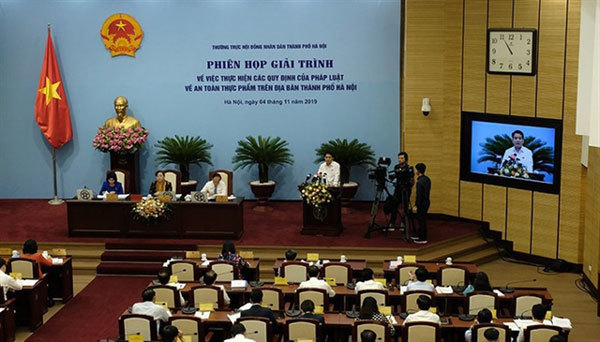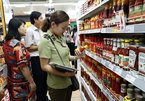 |
| A view of the meeting on food hygiene and safety of the standing committee of the city’s People's Council yesterday. Photo vneconomy.vn |
At a meeting of the standing committee of the city’s People's Council yesterday, Chung said there were many shortcomings in food safety and hygiene control in the city, which have not met standards.
Chairman of the municipal People's Council Nguyen Thi Bich Ngoc said there were more than 70,000 food production businesses, seven industrial slaughterhouses, 44 semi-industrial slaughterhouses, 937 traditional slaughterhouses, 454 markets, 120 supermarkets and 22 commercial centres of food businesses in the city.
The production of food only met about 60 per cent of demand. The rest must be imported from neighbouring provinces, raising concerns over food safety and hygiene for consumers.
Ngoc said violations in the transport and trading of unhygienic food remained complicated. The operation of illegal slaughterhouses in residential areas, which failed to meet hygiene regulations and polluted the environment, and the illegal transport of vegetables were still unsolved.
Nguyen Quang Thang, member of the People's Council of Hoan Kiem District, raised concern over agricultural food and fruits without clear origin sold at markets and supermarkets.
Pham Dinh Doan, member of the People's Council of Hoang Mai District, asked about the quality of bottled water and boxes of ice.
Responding to the question on food origin, director of the city’s Department of Health Nguyen Khac Hien the city has clearly decentralised responsibilities of departments, branches and districts in the management of food origin.
Industrial and commercial units and agriculture units have done a good job of food traceability. However, the units should encourage people to report violators to authorised agencies, he said.
Director of the municipal Department of Industry and Trade Le Hong Thang said Hanoi had 25 shopping centres, 110 supermarkets, and more than 1,700 utility stores, of which 807 sold fruit and vegetables.
All the stores must have the certificates of clear origin for their goods. The city’s market watch regularly fined violators, but Thang admitted some businesses were found to violate the regulations on the expiry dates of the goods.
In terms of bottled water quality, Hien said 425 bottled water businesses were operating in the city. Most used tap water for their source and some used well water.
Hien said the department would fine violating businesses and publicise their names on the department’s website.
Nguyen The Vinh, member of the People's Council of Dong Da District, said the rate of substandard food samples found in the past three years remained unchanged – about 5.8 per cent of total. He called for stricter inspections on the issue.
A representative from the city’s Market Watch Department said light penalties and loose management due to a shortage of staff were the main reason.
The inspectors would tighten control on food safety, including the illegal transport and trading of substandard food, and name and shame violators.
Speaking at the meeting, chairman Chung said the city has asked the Government for permission to use the city’s budget to repair markets, improving the quality of food.
The city has been working on a mechanism for modern slaughterhouses to encourage investment in the field and moving traditional slaughterhouses to slaughter zones for tight management. VNS

Difficulties remain in ensuring food safety in Hanoi
Efforts to improve food service quality have spurred positive changes in the capital city of Hanoi, however, challenges remain in food safety control work, experts said.
 Hanoi will focus on inspecting food origin to bolster food quality control in the coming months, chairman of the city’s People’s Committee Nguyen Duc Chung said on Monday.
Hanoi will focus on inspecting food origin to bolster food quality control in the coming months, chairman of the city’s People’s Committee Nguyen Duc Chung said on Monday.